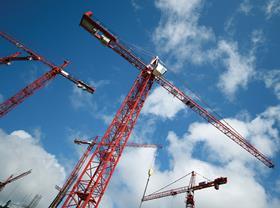Tender price inflation is being boosted by material costs and skill shortage

Construction may be stuck in recession after shrinking again in the fourth quarter of last year but new data from ��ɫ����TV and Aecom suggests tender prices are expected to continue to climb in 2018.
Tender price inflation is being forecast to hit 2.7% in the 12 months between the between the third quarter of 2017 and the third quarter of this year, before slipping to 1.9% for the 12 months from the third quarter of 2018 and the same period next year as political events create further headwinds to pile the pressure on the UK economy.
The growth in tender prices is being sustained by inflation on imported goods, according to Aecom, which is still being fed through the construction supply chain following sterling’s slide in the wake of 2016’s Brexit vote.
And the ongoing skills shortage continues to be felt, with contractors reporting wage rises in an attempt to try to secure staff. Demand is said to be particularly strong for staff with supervisory, managerial and professional skills.
But a majority of trades reported a decline month-on-month for on-site disciplines reflecting the fall over last year in construction activity.
Earlier this week, Mace ramped up its tender pricing forecast for 2018 as it said rising material costs and higher wages for construction workers were outweighing concerns over Brexit and the UK economy.
The firm’s consultancy arm has revised upwards its forecast among national tenders from 0.5% to 1.5%, and in London from zero to 1%.
Forecasts for 2019, 2020 and 2021 remain unchanged at 1.5%, 3% and 4% for both national work and peojects in the capital.



























No comments yet